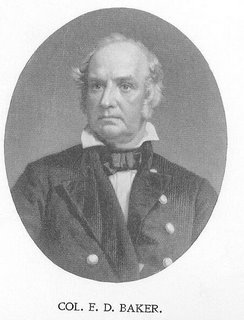
Oregon Republican League:Republican League Register of Oregon, The Register Publishing Company, 1896, page 178.
BAKER, COLONEL EDWARD DICKERSON, first Republican senator from Oregon, was born in London, England, February 24, 1811. He was four years of age when his family came to America and located in Philadelphia. He was early apprenticed to weaver, but, his father being an educated man and a teacher, young baker did not lack for mental training. At the age of fourteen he accompanied the family to Illinois, settling in the Wabash valley, but soon crossing the state in to Belleville. Here, young Baker won the favor of Governor Edwards and had access to his fine library, and stored his mind with the gems of literature. At the age of eighteen he went to St. Lois to find employment, and drove a dray. A little later he began the study of law at Carrollton, Illinois, in the office of Judge Caverly, at the same time serving as Deputy County Clerk. Before he was of age he had secured a license to practice law. In 1832 he served as a private in the Black Hawk war. In 1845 he was elected to congress, being the only Whig from the state of Illinois. The next year he raised a regiment for the Mexican was and served with distinction until its close. Later he went to California, and, with the murdered Senator Broderick, fought bitterly the pro-slavery Democratic rulers of the state. So great a reputation as an orator did he make, that the first Republican state convention held in Oregon decided to invite him to come north to stump the state. A little he came to Oregon and charmed and fired all with his eloquent pleas for liberty and union, and in 1860 was elected the first Republican to represent the state in the United States Senate. He went to Washington when treason was plotting openly, and at once became a commanding figure in the senate, his matchless oratory and fiery denunciation of traitors compelling all to yield to him the first place in debate. When Sumpter was fired upon he went to Philadelphia and recruited the “California” regiment, of which he became colonel. He divided his time between his senatorial and military duties, and it was dressed in his uniform and after arriving hastily in the senate that he delivered that masterly, impassioned, extemporaneous reply to a treasonable speech just made by a Southern senator, which was one of the classics of the literature of liberty and popular government. A few months later , at the battle of Ball’s Bluff, October 21, 1861, while gallantly leading his brigade, he was killed, yielding up his life for the cause of liberty, in whose defense his voice has been raised for a quarter of a century.


No comments:
Post a Comment